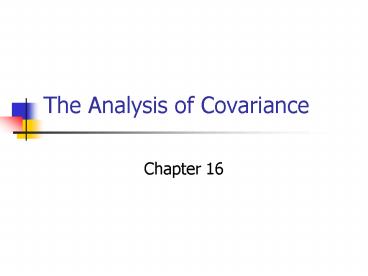The Analysis of Covariance - PowerPoint PPT Presentation
1 / 32
Title:
The Analysis of Covariance
Description:
The Analysis of Covariance. Chapter 16. Example 16.14. Simple Model. Covariate ... U alpha1. U alpha2. U alpha3. Unequal slopes - Another way to write the model ... – PowerPoint PPT presentation
Number of Views:26
Avg rating:3.0/5.0
Title: The Analysis of Covariance
1
The Analysis of Covariance
- Chapter 16
2
Example 16.14
3
Simple Model
Covariate
Common Slope
Factor Level
4
Simple Model
5
Hypothesis testing
- Simple Model
6
SPSS
7
SPSS Simple Model
8
SPSS - Simple
What is being tested ?
9
Estimates
eq1 Predicted sales 17.368
.899prev_sales
eq2 Predicted sales 12.292
.899prev_sales
eq3 Predicted sales 4.391
.899prev_sales
10
More Complex Model
Covariate
Different Slopes
Factor Level
11
Complex Model
12
Hypothesis testing
- Complex Model
13
SPSS - Complex
14
SPSS - Complex
What is being tested?
15
SPSS Complex
What are the prediction equations ?
16
Which model is appropriate?
- Simple ??
- Complex ??
- We do not know at this point
17
Need to test
18
L Matrix
- /lmatrix betas all 0 0 0 1 -1 0
- all 0 0 0 1 0 -1
19
Additional topics
- Expected Marginal Means
- Test at some other X
- RSQ
- Design Matrix
20
Problems Areas
- Multi-colinearity
- Problem Points
- Non-constant variance as a function of the
independents - Variable selection
21
Analysis of Covariance
- Another Approach
22
Unequal Slopes
23
(No Transcript)
24
Unequal slopes - Another way to write the model
25
(No Transcript)
26
(No Transcript)
27
(No Transcript)
28
(No Transcript)
29
Origin in the Anova Table
- What being tested is
- All the intercepts all equal
- this, in most cases, is extreme extrapolation
- who cares about X0
- EMM asks that the lines are equal for X the
mean of X - You might want to choose a different X
- SPSS does not allow Post Hoc Tests
30
Weight and OriginWeight In the Anova Table
- Weight - if the sums of the slopes is 0
- OriginWeight is testing is the deltas are zero
- If yes, then all slopes are equal
31
Example
- In this example the slopes are not all equal -
why? - What are the three slopes?
- We need the parameter output
32
(No Transcript)































